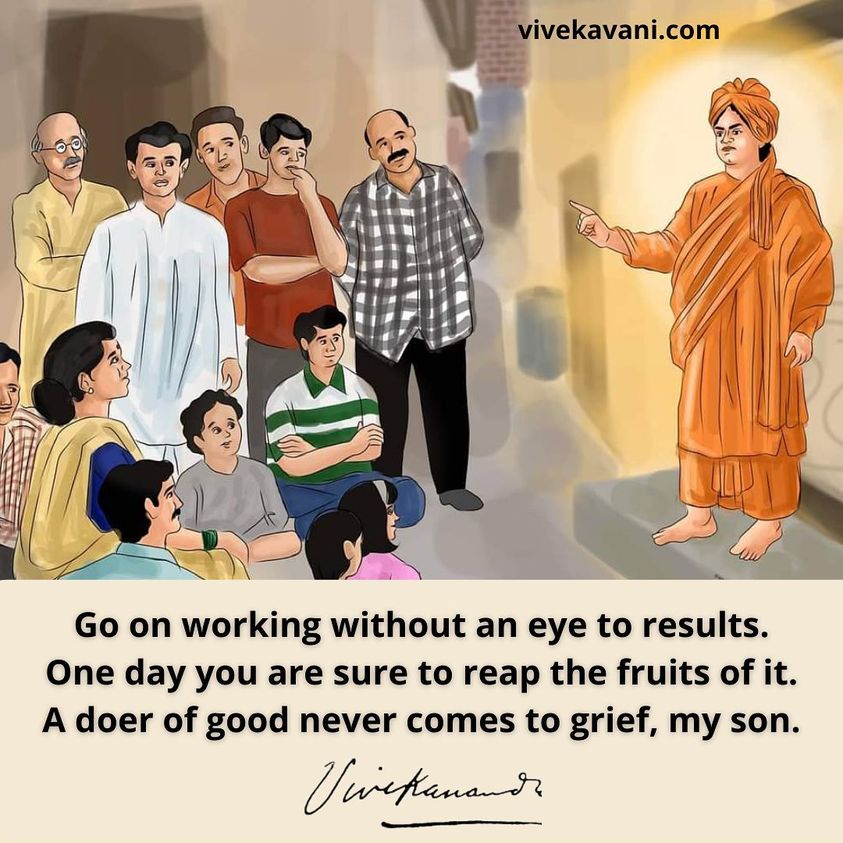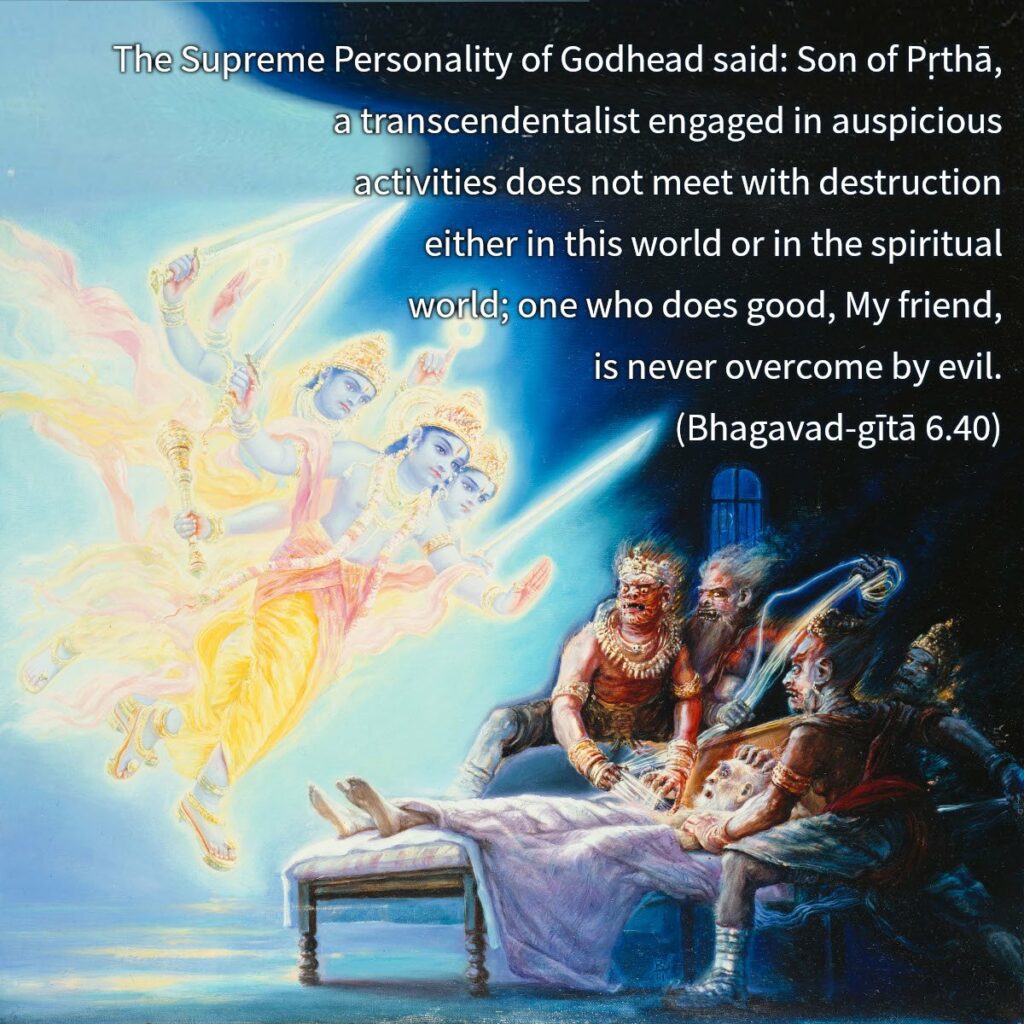श्रीभगवानुवाच |
पार्थ नैवेह नामुत्र विनाशस्तस्य विद्यते |
न हि कल्याणकृत्कश्चिद्दुर्गतिं तात गच्छति || 40||
śhrī bhagavān uvācha
pārtha naiveha nāmutra vināśhas tasya vidyate
na hi kalyāṇa-kṛit kaśhchid durgatiṁ tāta gachchhati
śhrī-bhagavān uvācha—the Supreme Lord said; pārtha—Arjun, the son of Pritha; na eva—never; iha—in this world; na—never; amutra—in the next world; vināśhaḥ—destruction; tasya—his; vidyate—exists; na—never; hi—certainly; kalyāṇa-kṛit—one who strives for God-realization; kaśhchit—anyone; durgatim—evil destination; tāta—my friend; gachchhati—goes
Translation:
The Lord said: O Pārtha, there is no destruction for him either in this world or the next: no evil, My son, befalls a man who does good.
Commentary:
The Lord blesses all those who are engaged in good work. Though the aspirant fails to achieve perfection, he does not suffer destruction either in this world or in the next. That is the Lord’s promise to all seekers. It is like a life-giving elixir to all people who are doing good in some form or other. People may doubt whether any good comes to them by being and doing good. In fact, to the ignorant, the world presents the curious spectacle of bad people enjoying more material comforts than the good and the righteous. But a closer look into the facts of life shows that the wicked and the evil-minded are daily undergoing destruction in their own heart of hearts, and they shall be hurled into lower and lower planes of existence. The good live and thrive in the sun-shine of God’s grace, though material riches they may not possess. They need to have no doubt about their present or future because the Lord here declares that they will never come to a bad state. Let this promise of the Lord be remembered, whenever doubt or fear enters one’s heart.
“Do good, your future is assured.” This is the Lord’s call to all seekers. Though Arjuna’s question pertains to the votaries of Dhyanayoga, Lord gives a general answer which embraces all those who are working on the spiritual path in different ways. So the general term (Kalyana krit) (Who does good) is used. It is implied that the evil-doers shall suffer a terrible doom here and hereafter. So let nobody indulge in sinful activities. The Lord gives the hope that whatever is left undone by the seeker shall be completed by him in later life to come.
The Lord addresses his disciple in the most endearing terms as ‘O my son’ (Tata). The Lord has a paternal attitude towards all sadhakas, and will always take care of them here and here-after. The love and compassion of the Lord for the devotee is revealed here.

Swami Vivekananda Says —
[The following paragraph is a reminiscence by Swami Vivekananda’s disciple Sharat Chandra Chakravarty.]
At the time Belur Math was established, many among the orthodox Hindus were wont to make sharp criticism of the ways of life in the Math. Hearing the report of such criticism from the disciple, Swamiji would say (in the words of the couplet of Tulasidas), “The elephant passes in the market-place, and a thousand curs begin barking after him; so the sadhus have no ill-feeling when worldly people slander them.” Or again he would say, “Without persecution no beneficent idea can enter into the heart of a society.” He would exhort everybody, “Go on working without an eye to results. One day you are sure to reap the fruits of it.” Again, on the lips of Swamiji were very often heard the words of the Gita, “A doer of good never comes to grief, my son.”[Source]
In reference to me every now and then attacks are made in missionary papers (so I hear), but I never care to see them. If you send any of those made in India, I should throw them into the wastepaper basket. A little agitation was necessary for our work. We have had enough. Pay no more attention to what people say about me, whether good or bad. You go on with your work and remember that “Never one meets with evil who tries to do good.”[Source]
Disciple: But where is that strength in us? I should have felt myself blessed if I had a hundredth part of your powers, Swamiji.
Swamiji: How foolish! Power and things like that will come by themselves. Put yourself to work, and you will find such tremendous power coming to you that you will find it hard to bear. Even the least work done for others awakens the power within; even thinking the least good of others gradually instils into the heart the strength of a lion. I love you all ever so much, but I wish you all to die working for others — I should rather be glad to see you do that!
Disciple: What will become of those, then, who depend on me?
Swamiji: If you are ready to sacrifice your life for others, God will certainly provide some means for them. Have you not read in the Gita the words of Shri Krishna, “Never does a doer of good, O my beloved, come to grief?”[Source]
Disciple: Sir, to start Feeding Homes we want a site first, then buildings, and then the funds to work them. Where will so much money come from?
Swamiji: The southern portion of the Math premises I am leaving at your disposal immediately, and I am getting a thatched house erected under that bael tree. You just find out one or two blind or infirm people and apply yourself to their service. Go and beg food for them yourself; cook with your own hands and feed them. If you continue this for some days, you will find that lots of people will be coming forward to assist you with plenty of money. “Never, my son, does a doer of good come to grief.”[Source]
Duty has no end, and the world is extremely selfish. Be of good cheer. “Never a worker of good came to grief.”[Source]
If you really want the good of others, the whole universe may stand against you and cannot hurt you. It must crumble before your power of the Lord Himself in you if you are sincere and really unselfish.[Source]
Question: What is the future of Yogabhrashta?
Answer: He shall not perish either in this world or in the next. He will attain what is good.
Question: What is Lord’s view about the good?
Answer: Whoever does good, will never come to a woeful end.

Bhagavad Gita: Chapter 6 🔻 (47 Verses)

Related Articles: